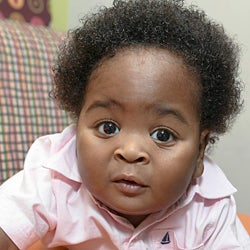Bladder Outlet Obstruction
One-year-old Landon Wilson is a happy, alert and playful boy. He says “bye, bye,” loves to play patty-cake and melts hearts with his contagious laugh. But behind the big smiles and energetic spirit is a fierce will to live. When Lasheka Pulliam was pregnant with Landon, she and his father, Allan Wilson, received a prenatal diagnosis that their son had a bladder outlet obstruction – a blockage that reduces or stops the flow of urine into the urethra, which carries urine from the body. Lasheka and Allan also learned that the obstruction damaged Landon’s kidneys. “I think at that time it happened to one in every 8,000 babies, and is more common in boys, and I’m thinking my son had to be that one,” Lasheka said. “I was so concerned about my child and what he’d have to endure, but I was still very hopeful, very optimistic, and I knew in my heart and mind he would be okay.” After 23 hours of labor, Lasheka gave birth to Landon at the University of Alabama at Birmingham (UAB) Women & Infants Center. In addition to the expected kidney damage, Landon had gastrostomy complications and a hernia. Landon was rushed to Children’s of Alabama, which is connected to UAB, and placed in the Neonatal Intensive Care Unit (NICU). Doctors worked to stabilize his breathing first. His oxygen levels fluctuated from 20 to 80%, presenting a poor and uncertain prognosis. Landon was placed on an ECMO machine that did the work his lungs and heart could not as well as a ventilator to help him breathe. Once his breathing stabilized and his lungs grew stronger, Landon transitioned to a continuous blood dialysis machine that would work in place of his damaged kidneys. The machine, the Aquadex FlexFlow System, was initially designed to remove fluid from blood in adults with heart failure until Children’s pediatric nephrologist Dr. David Askenazi discovered the machine could be repurposed for neonate dialysis. Historically, dialysis has been used sparingly in NICUs because machines designed for adults can cause severe complications in babies. Because of Dr. Askenazi’s discovery, Children’s is the first pediatric hospital to safely provide dialysis to babies. Kara Short, a certified registered nurse practitioner in pediatric nephrology at Children’s, said for babies like Landon born with diseased or absent kidneys, Aquadex has given them a chance at life. “Given Landon’s tenuous status and need for multiple support devices at birth to keep him alive, we were not sure if he would survive, He continued requiring maximal respiratory and cardiac support as well as dialysis in those first few weeks,” Short said. He not only survived, but has continued to amaze us with his healing, growth and development. Today, he requires no oxygen and no dialysis!” “The medical staff at Children’s is truly one of a kind,” Lasheka said. “Every single person working in the NICU is phenomenal and that’s putting it lightly. They were so accommodating, patient, empathetic and understanding.” Landon had to remain heavily sedated while receiving treatment. “I wasn’t able to hold him until he was 3½ weeks old,” Lasheka recalls. “I didn’t even see his eyes until two weeks after he was born. The best advice I received in those days was to remain positive no matter what, so that is what I did.” Lasheka was at the hospital most every day during his stay. Following surgeries to correct his bladder obstruction, repair his hernia and insert a feeding tube, Landon came through with flying colors. “He has always been a fighter and is very strong,” Lasheka said. “He eventually improved enough to where the Children’s staff started training me on how to take care for him so I could bring him home.” Finally, at 6 months old, Landon went home to Jackson’s Gap for the first time. “It was difficult and overwhelming at first, but I quickly became accustomed to everyday life with a renal baby,” Lasheka said. Though he still has a feeding tube, Landon is now doing well and visits Children’s periodically for checkups. One day, he will need a kidney transplant. “I am forever indebted to the staff at Children’s,” Lasheka said. “I attribute Landon’s positive outcome first to God, the many prayers and support from family and friends, and the diligence and hard work of the staff, his dad and myself.”







